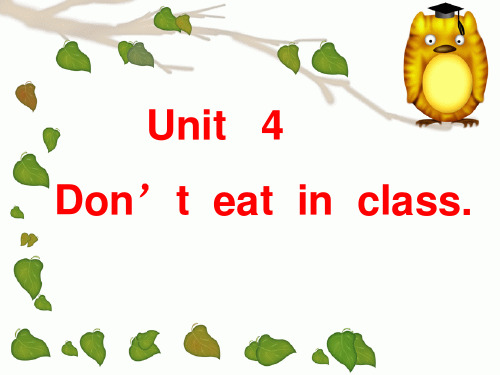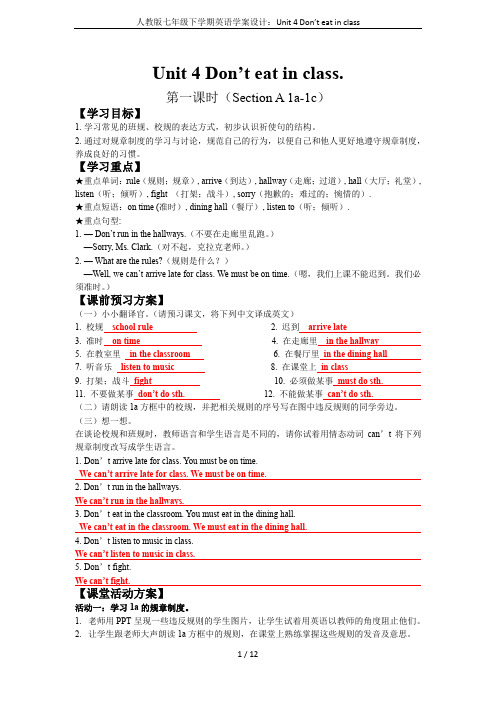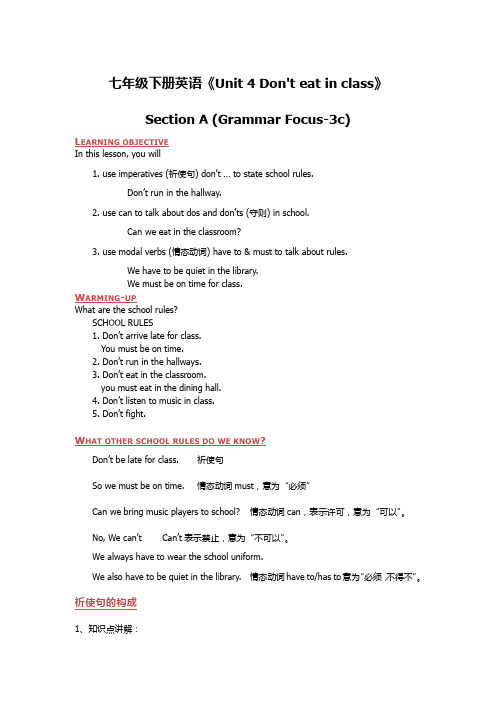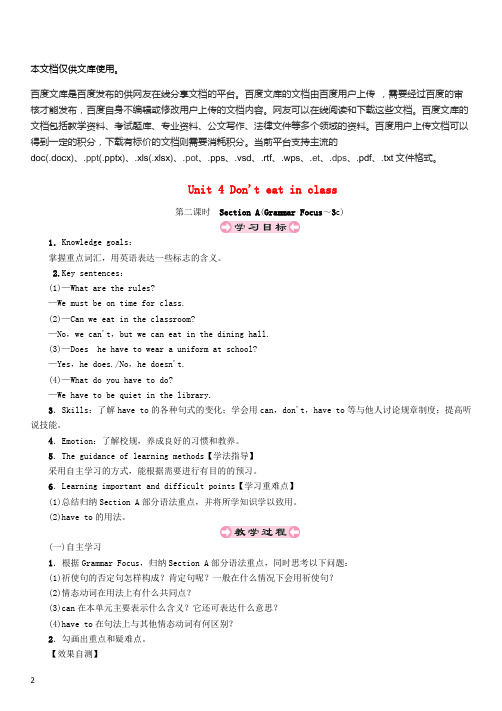Unit4Don’teatinclass.SectionAGrammarFocus-3cPeriod3
人教版七年级英语上册教案Unit 4 Don't eat in class第二课时

第二课时Section A (Grammar Focus-3c) 课时目标观察下列句子并总结规律1.Don't run in the hallways.2.Don't fight.3.Keep quiet.4.Never give up.5.Be a good student.6.Be quiet.7.Let's go.结论:祈使句的用法:祈使句是用来表示请求、命令、叮嘱、邀请、劝告等的句子,一般以动词原形开头。
祈使句的分类:①Do型祈使句(以Don't+动词原形开头)②V型祈使句(以行为动词原形开头)③Be型祈使句(以Be开头)④Let型祈使句(以Let开头)教学过程环节1新课导入T:As the proverb goes, “No rules, no standards”. Let's get to know some school rules.T:Can we arrive late for class?Ss:No, we can't.T:Can we run in the hallways?Ss:No, we can't.T:Can we eat in the classroom?Ss:No, we can't. We can eat in the dining hall.T:Can we listen to music in class?Ss:No, we can't.T:Can we fight?Ss:No, we can't....设计意图:通过用can的一般疑问句的问答,一来可以让学生明白一些应该遵守的规则;二来可以让学生学习怎么用can这个词来表达一些规章制度,也为下面讲can的用法做铺垫。
环节2学习Grammar Focus-3c1.让学生浏览并翻译Grammar Focus方框中的句子,并让学生用方框中的句子组成对话。
Unit4_Don't_eat_in_class复习

SectionB Summary: • 1.Talk about family rules • 2.have/has • have to /must
Can you list the rules of the Jones family?
the Jones family
Don’t talk loudly at home. 1. _______________________ Don’t watch TV late at night. 2. _______________________
1.Don’t r____ un in the hallways. 2.Don’t a____ rrive late for the meeting. 3. He likes singing and dancing.(否定句) He doesn’t like singing or dancing. break rules 4.在外面吃饭 eat outside keep /obey rules 5.学校规章制度 school rules 6.上课迟到 be / arrive late for class in class 7.在课上 8.和某人打架 have a fight with sb./ fight with sb. 9.arrive—arrives—arriving—arrived 10.fight— fights—fighting—fought
6. _______________________ Don’t play the guitar late at night.
用have to或has to填空 1.We have to clean our classroom after school. has to 2.She make her bed after getting up. has to 3.It’s late. Mr Beckman go to work by car. 4.Emily and Peter join a music club. have to They practice guitar every day.
Unit4_Don't_eat_in_class_SectionA

Jill 没有必要每天步行上学。
(3) 疑问句: Do (Does) +主语+have to +动词原形+其
他
她在学校不得不穿制服吗?是的。
Does she have to wear a uniform at school?
Don’t listen to music in the classroom.
3. You can’t open the window.
Don’t open the window.
4. Close the door , please. (改为否定句) Don’t close the door.
John: Hi, my name’s John. It’s my first day at school
rule
school rules(校规) class rules(班规) break rules(违反规则)
rule
They in class . Don’t eat eat in the classroom. You must eat in the dining hall.
rule
He listens to music in class . Don’t listen to music in class.
in, please! 请进! Sit down, please. 请坐。
Grammar
祁使句 Example: 肯定祁使句 1. Sit down. 2. Come in. 3. Eat at home. 4. Listen to music outside. 5. Do your homework at school. 否定祁使句
人教版七年级下学期英语学案设计:Unit 4 Don’t eat in class

Unit 4 Don’t eat in class.第一课时(Section A 1a-1c)【学习目标】1.学习常见的班规、校规的表达方式,初步认识祈使句的结构。
2.通过对规章制度的学习与讨论,规范自己的行为,以便自己和他人更好地遵守规章制度,养成良好的习惯。
【学习重点】★重点单词:rule(规则;规章), arrive(到达), hallway(走廊;过道), hall(大厅;礼堂), listen(听;倾听), fight (打架;战斗), sorry(抱歉的;难过的;惋惜的).★重点短语:on time (准时), dining hall(餐厅), listen to(听;倾听).★重点句型:1.— Don’t run in the hallways.(不要在走廊里乱跑。
)—Sorry, Ms. Clark.(对不起,克拉克老师。
)2.— What are the rules?(规则是什么?)—Well, we can’t arrive late for class. We must be on time.(嗯,我们上课不能迟到。
我们必须准时。
)【课前预习方案】(一)小小翻译官。
(请预习课文,将下列中文译成英文)1. 校规school rule2. 迟到arrive late3. 准时on time4. 在走廊里in the hallway5. 在教室里in the classroom6. 在餐厅里in the dining hall7. 听音乐listen to music 8. 在课堂上in class9. 打架;战斗fight 10. 必须做某事must do sth.11. 不要做某事don’t do sth. 12. 不能做某事can’t do sth.(二)请朗读1a方框中的校规,并把相关规则的序号写在图中违反规则的同学旁边。
(三)想一想。
在谈论校规和班规时,教师语言和学生语言是不同的,请你试着用情态动词can’t将下列规章制度改写成学生语言。
新目标七年级下Unit_4_Don't_eat_in_class_Section_A_2

句型转换 1. He has to eat breakfast quickly. (改为一 般疑问句) __________________________________ Does he have to eat breakfast quickly? 2. Play volleyball after class. (改为否定句) ________________________________ Don’t play volleyball after class.
Great! Jim’s school is the coolest.
Discuss and make rules for the computer room in your school. Computer Rules 1. _______________ 2. _______________ 3. _______________ 4. ________________ 5. ________________
方法指导: 1. 由图示可知都是一些禁止类的祈使句。 2. 可知应用“Don’t + 动词原形”句子。
3b Use the words to make questions about the rules. Then write answers according to your school. 1. Be quiet? (she/have to /in the library) Q: Does she have to be quiet in the library? A: Yes, she does.
1. 根据例句,可知要求我们造一般疑问句 并根据实际情况进行回答。 2. 先确定句子的主语。 3. 再确定用情态动词还是用助动词来构成
七年级下册英语《Unit 4 Don't eat in class》Section A (Grammar Focus-3c)

七年级下册英语《Unit 4 Don't eat in class》Section A (Grammar Focus-3c)L EARNING OBJECTIVEIn this lesson, you will1. use imperatives (祈使句) don’t … to state school rules.Don’t run in the hallway.2. use can to talk about dos and don’ts (守则) in school.Can we eat in the classroom?3. use modal verbs (情态动词) have to & must to talk about rules.We have to be quiet in the library.We must be on time for class.W ARMING-UPWhat are the school rules?SCHOOL RULES1. Don’t arrive late for class.You must be on time.2. Don’t run in the hallways.3. Don’t eat in the classroom.you must eat in the dining hall.4. Don’t listen to music in class.5. Don’t fight.W HAT OTHER SCHOOL RULES DO WE KNOW?Don’t be late for class. 祈使句So we must be on time. 情态动词must,意为“必须”Can we bring music players to school? 情态动词can,表示许可,意为“可以”。
No, We can’t Can’t表示禁止,意为“不可以”。
七年级英语下册-Unit-4-Don‘t-eat-in-class教案-(新版)人教新目标版

Unit 12 Don’t eat in class.I.教学设计分析本单元的中心话题是rules,主要语言功能是谈论并制定某些规章制度,如校规、班规和家规。
语言结构为祈使句。
利用情态动词can, must, have to 来谈论一些规章制度。
在Section A里通过活动与图片的配对,引出本部分中关于“学校的规章制度”及否定祈使句。
主要训练学生的听、说、演及其归纳总结的水平。
Section B主要通过一系列的句式进一步训练目标语言,并注意have to与 must, can与can’t的用法。
最后是要能使用所学的知识去制定一定的规则。
New languages:1.- Don’t run in the hallways. Don’t fight.2.-What are the rules? We must be on time for class.3.-Can we eat in the classroom?-No, we can’t, but we can eat in the dining hall.4.-Can we wear a hat in class? Yes, we can./ No, we can’t.5. - Does he have to wear a uniform at school?-Yes, he does. / No, he doesn’t.6. What do you have to do? We have to be quiet in the library.II. 教学学时分配Teaching periods:Period 1: Section A 1a -1cPeriod 2: Section A 2a -2cPeriod 3: Grammar Focus/ 3a -3cPeriod 4: Section B 1b -1fPeriod 5: Section B 2a-3c and self checkPeriod 6: Review Unit 1Unit 4 Don’t eat in class.Section A (1a-1c)1.Master the key words:rules, hallway, classroom, Mrs. fight, school rules.Master the sentences: 1). Don’t eat in class.2).You must be on time.3). Eat in the dining hall.2.Talk about the school rules.3.Listening and speaking skills and communicative competence.4. Encourage students to talk about the rules.5. To help Ss use the target language in natural speech.II. Key points1. Talk about the school rules and the target language.2. Learn to talk about the school rules.3. Imperatives Don’t...Difficult point:1. Talk about the school rules and the target language.2. Learn to talk about the school rules.III. Teaching aidsMultimedia/A tape recorder/A blackboardIV. Teaching proceduresStep1 Leading-inWarming-upT:What’s the woman doing? S: Sh e’s eating.T: Where is she eating? S: Sh e’s eating in class.T:Can you eat in class? S: No, we can’t.T: So please don’t eat in class.(= You can’t eat in class.)…Step 2 Presention1. T: Now, Look at the picture on your textbook. Each of the students is breaking one ofthese rules.Please finish 1a.1. Don’t arrive late for class. You must be on time.2. Don’t run in the hallways.3. Don’t eat in the classroom. You must eat in the dining hall.4. Don’t listen to music in class.5. Don’t fight.2. Listening1). T: Now let’s listen! What rules are these students breaking? Write the numbers after names?Peter ______ Amy ______ Mike ______2). Check the answers:3). Listen again and complete the conversation.Ms. Clark: Hey, Peter. You know the rules. Don’t _________________.Peter: Sorry, Ms. Clark.Mr. Smith: Amy, don’t _______________________.Amy: Oh, sorry, Mr. Smith.Mr. Smit h: Hey, Mike, don’t ______________ in class. Mike!Boy: He can’t hear you, Mr. Smith.Step3 ConsolidationPair workS.A is a new student. S.B is telling S.A about the school rules.Ask students to practice the conversation and make their own conversations.Ss work in pairs and practice saying the school rules.A: What are the rules?B: Well, we can’t arrive late for class. We must be on time.…Step 4 Summary1. Words: rules, arrive, late, hall, dinning hall, listen, listen to, fight, sorry Phrases: on time listen to… arrive/be late forSentences: 1. Don’t arrive late for class.You must be on time.2. Don’t run in the hallways.3. Don’t eat in the classroom. You must eat in the dining hall.4. Don’t listen to music in class.5. Don’t fight.2. Assign homework:1). Copy the new words (5E, 1C).2). Try to remember the words and expressions and use them freely.3). Write the rules in your school with“Don’t …. We can’t.... We must...”. V. Blackboard designUnit 4 Don’t eat in class.Section A1. Don’t arrive late for class.You must be on time.2. Don’t run in the hallways.3. Don’t eat in the classroom. You must eat in the d ining hall.4. Don’t listen to music in cla ss.5. Don’t fight.Teaching reflection:。
人教版英语七年级下册Unit 4 Don't eat in class Grammar课件

--- No, you_____.Only on Mondays.Tomorrow is Tuesday.
A.mustn’t B.needn’t C.can’t
D.shouldn’t
(3) ---Can I swim in the lake,Mom? It’s so hot.
---No, you ______.The sigh says “No swimming”
It’s dangerous.
---OK, I won’t do that again, mom.
A.mustn’t B.) Look at the sign!(标志) “No _____s_w__im__m__i.n”Ygou can’t
swim here.
(4)上课不要迟到。
和fig某ht 人wit打h s架b. w戴ea帽r a子hat a许lot多of wear the穿sc校ho服ol uniform
liste听n 音to m乐usic 不ha得ve 不to
必mu须st
in在the走h廊allw上ays
Let’s say eat
dining hall
Can we__e_a_t__in__t_h_e__c_l_a_s_s_r_o_o_m_?
归纳: 观察例句1-6,祈使句的否定句Don’t形式:
_D__o__n__’t__型_ : ____D__o_n__’_t__+__动___词___原__形___/_b__e__+__其. 他
Let’s learn
祈使句 :Let’s 型
1.Let’s join the art club.
2.Let’s run after school.
初中英语七年级下册 Unit4 Don't eat in class.sectionA(gramma

初中英语七年级下册Unit4 Don’t eat in class.sectionA(grammar focus-3c)教学设计一. 教材分析本课是人民教育出版社出版的初中英语七年级下册Unit 4 Don’t eat in class的Section A (Grammar Focus-3c)。
本节课主要讨论规则和习惯,学生通过听、说、读、写等多种方式学习和掌握一般现在时的肯定句、否定句和疑问句的结构。
同时,学生能够运用所学的语言知识进行实际操作,如制定学校规则和讨论日常生活中的习惯。
二. 学情分析学生在小学阶段已经学习了一般现在时,对本节课的内容有一定的了解。
但部分学生对一般现在时的否定句和疑问句结构还不够熟悉,需要老师在课堂上进行重点讲解和操练。
此外,学生的听说能力有待提高,因此,在教学过程中,老师应充分利用多媒体教学资源,创设真实的情景,激发学生的学习兴趣和积极性。
三. 教学目标1.知识目标:学生能够掌握一般现在时的肯定句、否定句和疑问句的结构,并能够运用这些结构进行简单的交流。
2.能力目标:学生能够通过听、说、读、写等多种方式,运用所学的语言知识进行实际操作,如制定学校规则和讨论日常生活中的习惯。
3.情感目标:学生能够意识到遵守规则和养成良好习惯的重要性,培养他们的合作意识和团队精神。
四. 教学重难点1.重点:学生能够掌握一般现在时的肯定句、否定句和疑问句的结构。
2.难点:学生能够灵活运用一般现在时进行实际操作,如制定学校规则和讨论日常生活中的习惯。
五. 教学方法1.情境教学法:通过创设真实的情景,激发学生的学习兴趣,提高他们的听说能力。
2.交际教学法:通过小组讨论、角色扮演等方式,培养学生的合作意识和团队精神。
3.任务型教学法:通过完成实际任务,如制定学校规则,提高学生的综合语言运用能力。
六. 教学准备1.教师准备:提前准备好教学课件、多媒体教学资源、教学卡片等。
2.学生准备:学生提前预习课本内容,了解一般现在时的基本结构。
七年级英语下册Unit4Don’teatinclass第2课时SectionAGrammarFocu

Unit 4 Don’t eat in class教学课题第二课时Section A (Grammar Focus-3c)教学目标【知识目标】Important phrases:wear a hat,wear a uniformImportant sentences:1.Don’t run in the hallways.2.—What are the rules?—We must be on time for class.3.—Can we eat in the classroom?—No,we can’t,but we can eat in t he dining hall.4.—Does he have to wear a uniform at school?—Yes,he does./ No,he doesn’t.5.—What do you have to do?—We have to be quiet in the library.【能力目标】1.学会使用祈使句。
2.能正确运用can表示“允许”。
【情感目标】培养学生遵规守矩的良好品质。
教学重难点1.祈使句。
2.情态动词can表示“允许”。
教学过程◆Step 1 Leading1.Let students talk about their rules at home.2.What rules do you like or dislike? Why?3.Ask several students to show the rules in his/ her home.◆Step 2 Learning Grammar Focus1.Ask stude nts to read the sentences in Grammar Focus and translate them into Chinese.2.Give a summary about imperative sentences and modal verbs,such as can,have to,must,etc.(见课件)◆Step 3 LearningWrite the rules for the school library according to the picture s in 3a.(见课件)◆Step 4 Writing1.Teacher asks students to read the model in 3b first.2.Ask students to write down the questions and answers.3.Let several students show their answers on the blackboard.4.Let students imagine he/she has a dream school.Let him/her make up five cool rules for theirdream school.Let students vot e for the Coolest School.(3c)教学过程◆Step 5 HomeworkWrite rules for th e library.板书设计Section A (Grammar Foc us-3c)重点短语1.wear a hat2.wear a uniform重点句型1.Don’t run in the hallways.2.—What are the rules?—We must be on time for class.3.—Can we eat in the classroom?—No,we can’t,but we can eat in the dining hall.4.—Does he have to wear a uniform at school?—Ye s,he does./ No,he doesn’t.5.—What do you have to do?—We have to be quiet in the library.课堂练习Ⅰ.根据汉语意思完成句子1.莉莉每天必须练习钢琴。
七年级英语下册 Unit 4 Dont eat in class(第2课时)Section A(G

本文档仅供文库使用。
百度文库是百度发布的供网友在线分享文档的平台。
百度文库的文档由百度用户上传,需要经过百度的审核才能发布,百度自身不编辑或修改用户上传的文档内容。
网友可以在线阅读和下载这些文档。
百度文库的文档包括教学资料、考试题库、专业资料、公文写作、法律文件等多个领域的资料。
百度用户上传文档可以得到一定的积分,下载有标价的文档则需要消耗积分。
当前平台支持主流的doc(.docx)、.ppt(.pptx)、.xls(.xlsx)、.pot、.pps、.vsd、.rtf、.wps、.et、.dps、.pdf、.txt文件格式。
Unit 4 Don't eat in class第二课时Section A(Grammar Focus~3c)1.Knowledge goals:掌握重点词汇,用英语表达一些标志的含义。
2.Key sentences:(1)—What are the rules?—We must be on time for class.(2)—Can we eat in the classroom?—No,we can't,but we can eat in the dining hall.(3)—Does he have to wear a uniform at school?—Yes,he does./No,he doesn't.(4)—What do you have to do?—We have to be quiet in the library.3.Skills:了解have to的各种句式的变化;学会用can,don't,have to等与他人讨论规章制度;提高听说技能。
4.Emotion:了解校规,养成良好的习惯和教养。
5.The guidance of learning methods【学法指导】采用自主学习的方式,能根据需要进行有目的的预习。
七年级英语下册 Unit 4 Don’t eat in class Section A(Gramma

Unit4课题Unit4 Section A Grammar Focus-3c 授课类型语法课标依据理解附录“语法项目表”中所列语法项目并能在特定语境合作使用;了解常用语言形式的基本结构和常用表意功能;在实际运用中体会和领悟语言形式的表意功能。
教学目标知识与技能1. 能使用目标语言谈论学校、图书馆的规则。
2. 能用所学内容解决实际问题。
3. 熟练掌握have to 的用法。
过程与方法通过对话展示、自主探究等活动,熟练使用Grammar Fo cus的重点句型情感态度与价值观理解没有规矩不成方圆;无论是在学校时还是在家庭中以及以后走上社会都应当遵守规则,学生应该懂得养成按规则行事的重要性。
教学重点难点教学重点Can we eat in the classroom?Yes, we can./No, we can’t.Does he have to wear a uniform at school?Yes, he does./No, he doesn’t.What do you have to do?We have to be quiet in the library.教学难点 1. 巩固祈使句的应用。
2. 理解have to 的意思、掌握have to的用法。
教学媒体选择分析表知识点学习目标媒体类型教学作用使用方式所得结论占用时间媒体来源介绍知识目标图片A G拓展知识2分钟自制讲解过程与方法图片A E建立表象5分钟下载观看过程与方法图片A E帮助理解5分钟下载理解情感态度价值观图片A I升华感情2分钟下载①媒体在教学中的作用分为:A.提供事实,建立经验;B.创设情境,引发动机;C.举例验证,建立概念;D.提供示范,正确操作;E.呈现过程,形成表象;F.演绎原理,启发思维;G.设难置疑,引起思辨;H.展示事例,开阔视野;I.欣赏审美,陶冶情操;J.归纳总结,复习巩固;K.其它。
②媒体的使用方式包括:A.设疑—播放—讲解;B.设疑—播放—讨论;C.讲解—播放—概括;D.讲解—播放—举例;E.播放—提问—讲解;F.播放—讨论—总结;G.边播放、边讲解;H.设疑_播放_概括.I讨论_交流_总结J.其他教学过程师生活动设计意图设计Step 1. Warm-up and revision (课堂热身和复习)(1) Show the pictures of activities that are happening in the school(学生在老师的引导下根据图片情景或实际情况进行对话交流复习上节课所学目标语言。
七年级英语下册 Unit 4 Don't eat in class Section A (Grammar Focus-3c) 第二课时

A:Can we run in the hallways?
B:No, we can’t. We can’t run
in the hallways.
'
.
A:So, don’t run in the
hallway
hallways.
A:Can we fight? B:No, we can’t. We can’t fight. A:So, don’t fight.
课文展现
3a Write the rules for the school library. Library rules 1. Don’t talk. Don’t eat. 2. __________ 3. Don’t __________ listen to ________ music . 4. __________ Don’t take photos. _______
dining hall
A: Can we listen to music in the classrooms? B: No, we can’t. We can’t listen to music in the classrooms. But we can listen to it in the music room. A: So, don’t listen to music in the classrooms.
3. Listen to music? Can we listen to music in the hallways? Q:_______________________________ (we/ can/ in the hallways)? A: ______________ No,we can’t.
七年级英语下册(人教版)Unit4 Don’t eat in class! Section AGrammar Focus﹠3c课件

I _h_a_v_e_t_o_do homework every day.
I h__a_v_e_t_o_c_l_ea_n__m__y_b_e_d_r_o_o_m_ on weekends.
3c Make up five cool rules for your dream school. Share your rules with the class. Your classmates vote for the Coolest School!
祈使句的常见句型结构
祈使句表示请求、命令、劝说、号召、 警告等。表示委婉的祈使语气,可在句首 或句末加上please,若在句末加please, 之前要用逗号隔开。祈使句有肯定祈使句 与否定祈使句两种。
3b Use the words to make questions about the rules. Then write answers according to your school.
将下面的句子改为祈使句,每空一词。
1. You can come in. _C__o_m_e_ __in__, please.
2. I can help you. _L__e_t _ me __h_e_lp__ you.
3. You can’t eat in class. __D_o_n_’_t_ __ea_t__ in class.
1. Be quite? Q: Does she have to be quite in the library? (she/have to/in the library) A: Yes, she does.
2. Eat? Q: D__o_e_s_h_e_h__a_v_e_t_o_e_a_t_i_n_t_h_e_d__in_i_n_g_h__a_ll_? (he/ have to/ in the dining hall)? A: _N_o_,_h_e__d_o_e_sn_’_t_. _H_e__c_a_n_a_l_s_o_e_a_t_o_u_t_s_id_e_.
人教版英语七年级下册Unit4 Don’t eat in class!Section AGrammar Focus-3c课件

Homework
Write a letter to your parents about the rules at home. Let them know your ideas.
_L__e_t’_s_w__a_lk__to__s_c_h_o_ol. 让我们踢足球。 (4) No + 动词-ing形式。表示“禁止、规劝” 禁止停车!No Parking. 禁止吸烟!No Smoking.
2. have to 与must 的用法
• 1. must “必须”(强调主观意志); • 没有人称和数的变化; • mustn’t “不准,禁止”
_W__e_m__u_s_t _b_e_o_n__t_im__e_f_o_r_c_l_a_ss_.______
5. 我们可以在教室里吃东西吗? _C_a_n__w__e_e_a_t_i_n_t_h_e_c_l_a_s_sr_o_o_m__?____
6. 不能。但我们可以在餐厅里吃东西。 _N_o_,_w__e_c_a_n_’_t_, _b_u_t_w_e__c_a_n_e_a_t_i_n__th_e___ _d_i_n_in_g__h_a_l_l.______________________
7. 我们可以在上课的时候带帽子吗? _C_a_n__w_e__w_e_a_r_a__h_a_t_i_n_c_l_a_ss_?______
8. 他在学校里必须穿校服吗?
D_o_e_s _h_e_h_a_v_e_t_o_w_e_a_r_a_u_n_i_fo_r_m__a_t_s_c_ho_o_l_?___ 9. 是的,必须。/ 不,不必。
A:_N__o_, _w_e__c_a_n_’t_.______
Wear a hat?
近年七年级英语下册 Unit 4 Don't eat in class(第2课时)Section

(贵阳专版)2017七年级英语下册 Unit 4 Don't eat in class(第2课时)Section A(Grammar Focus-3c)学案(新版)人教新目标版编辑整理:尊敬的读者朋友们:这里是精品文档编辑中心,本文档内容是由我和我的同事精心编辑整理后发布的,发布之前我们对文中内容进行仔细校对,但是难免会有疏漏的地方,但是任然希望((贵阳专版)2017七年级英语下册 Unit 4 Don't eat in class(第2课时)Section A(Grammar Focus-3c)学案(新版)人教新目标版)的内容能够给您的工作和学习带来便利。
同时也真诚的希望收到您的建议和反馈,这将是我们进步的源泉,前进的动力。
本文可编辑可修改,如果觉得对您有帮助请收藏以便随时查阅,最后祝您生活愉快业绩进步,以下为(贵阳专版)2017七年级英语下册Unit 4 Don't eat in class(第2课时)Section A (Grammar Focus-3c)学案(新版)人教新目标版的全部内容。
Unit 4 Don't eat in class第二课时Section A (Grammar Focus~3c)【学习目标】1.掌握一些重要短语和句型。
(1)重点单词和短语:out,go out,dish,do the dishes,night,before,dirty,kitchen,more,noisy,relax,read,terrible,feel,strict,be strict with sb.,remember,follow,follow the rules,luck(2)重点句型:There are too many rules! After dinner,I can’t relax either.2.进一步学习can,can’t,must和have to的用法。
- 1、下载文档前请自行甄别文档内容的完整性,平台不提供额外的编辑、内容补充、找答案等附加服务。
- 2、"仅部分预览"的文档,不可在线预览部分如存在完整性等问题,可反馈申请退款(可完整预览的文档不适用该条件!)。
- 3、如文档侵犯您的权益,请联系客服反馈,我们会尽快为您处理(人工客服工作时间:9:00-18:30)。
Unit 4 Don’t eat in class.Section A Grammar Focus-3c Period3Teaching and Learning Goals:一、语言知识和语言技能:1.能够熟练谈论校规Don’t run in the hallways. Don’t fight.What are the rules? We must be on time for class.Can we eat in the classroom? No, we can’t. But we can eat in the dinning hall.Can we wear a hat in class? Yes, we can.\ No, we can’t.Does he have to wear a uniform at school? Yes, he does.\ No, he doesn’t.What do you have to do? We have to be quiet in the library.2.能够正确读出下列单词:out; go out; practice; dish; do the dishes; before; classroom, fight, rule, outside, dining3.熟练掌握下列短语:fight against; be strict with sb; too mang; too much4.语法:(1)熟练运用have to, can以及他们句式的变化(2)掌握祈使句,肯定形式与否定形式句型及其使用方法。
5. 使用所学单词及其句型进行写作。
二、学习策略:1. 依据图片理解单词和短语。
(Understand and remember the words and phrases with the help of the new words and phrases.)2. 采用小组合作学习,检查巩固所学的祈使句句型。
(Remember the new words andphrases in groups.)3. 使用祈使句制定理想中学校的校规。
(Write the passage.)二、情感态度:明白学校设定规章制度的重要性,自觉遵守学校的校规校纪。
Teaching and learning steps:Step I. Preview:一、Translate them into English.在课上__________ 2. 在上学的晚上__________ 3. 校规_________禁止交谈________ 5. 听音乐________________ 6. 不得不_______在走廊上________ 8. 上学迟到______________ 9. 放学后_______二、把下面的句子补充完整。
1.你们学校有什么规定?What are the ____________in your school.2.请勿在走廊上追逐也不要上课迟到。
Don’t run and don’t _____________ class.3.我们可以在学校吃东西吗?Can we _______________in school?4.我们可以在食堂吃东西但不可以在课室吃。
We can eat in the _____, but we can't eat5.你们必须在学校穿制服吗?是的,我们要穿。
Do you ___________ at school? Yes, ______ _______.6.我们还有什么必须得做吗?你们必须打扫课室。
What do we have to do? You have to _____________.(设计说明:课前就布置给学生,提前熟悉词组和句子,有重点,有目的的预习可以为本节课的学习扫除障碍,通过习题的训练,是学生有针对性的学,同时可以检测学生的预习效果。
)StepⅡ.Warming up and leading in热身导入1.Lead-in“His name is Xiaoxin. He is a new student. You are xiaoxin’s new classmates, please tell him what are the school rules.”1. Ask the students to ask and answer in pairs.Can I run in the hallways? No, you can’t.Can I wear a hat in class? No, you can’t.Don’t run in the hallways. Don’t wear a hat in class.Can I fight? No, you can’t.Don’t fight.Can I eat in class? No, you don’t.Don’t eat in class.Can I sleep in class? No, you don’t.Don’t sleep in class.What do I have to do? You must be on time for class.You must wear a uniform at school. 2. “Do you know other school rules? Please tell Xiaoxin.” Ask the students to talk in groups.(设计意图:通过学生喜闻乐见的卡通人物图片展示,给学生们创设易于理解和表达的语境,抓住学生的注意力。
又通过介绍小新是学校的新同学,要求学生给小新介绍学校的校规校纪导入,巩固校规的表达方法,从而熟悉句型和can, have to的用法。
)StepⅢ.Grammar FocusSum up:Let the students make conversations.(设计意图:通过本项训练,旨在培养学生获取知识善于总结的能力,并能通过做对话练习中训练重点和难点。
)StepIV Ask some students to write them down on the blackboard“Xiaoxin wants to know what are the rules in the library. Can you tell him?”3a. Write the rules for the school library.Don’t talk.Don’t eat in the library.Don’t listen to music. Don’t take photos. Library Rules1. Don’t talk.2. Don’t eat in the library.3. Don’t listen to music.4. Don’t take photos.3b Use the words to make questions about the rules. Then write answers according to your school.Be quiet?Q: ___________________________________ (she / have to / in the library)?A: ___________________________________Eat?Q: ___________________________________ (he / have to / in the dining hall)?A: ___________________________________Listen to music?Q: ___________________________________ (we / can / in the hallways)?A: ___________________________________Wear a hat?Q: ___________________________________ (we / can / in the classroom)?A: ___________________________________StepV Report(1) Make up five cool rules for your dream school. Share your rules with the class. Your Don’t talk.classmates vote for the Coolest School!1. We can eat in class.2. We don’t have to come to school every day.3. …(2) A report. “My Coolest school.”At my dream school, we don’t have to come to school every day. We can eat in the classroom. We can listen to music in class. We don’t have to do homework. We don’t have to wear the school uniform at school...(设计意图:本环节是对知识点的灵活运用,句子可以让学生到黑板上去写,规范一下学生的书写,以及一些注意事项和学生容易出错的地方,然后用之前学习过的句子准备一篇作文:我理想的学校,既巩固了知识点的运用,也锻炼了学生的口头表达,提升了学生的个人能力。
)Step VI Summary:Inquiry into knowledge by filling in the blanks一、No talking ! 禁止交谈。
no后面加上名词或___________也表示不要做某事。
与don't +do的用法相似。
E.g.:( 1) No wet umbrellas! =__________ put wet umbrellas here!禁止放湿雨伞!(2)No food! =__________ eat food here!禁止吃食物!(3)No smoking! =___________ smoke here!禁止吸烟!二、can(1)表示能力:Eg: ______________ you play the guitar? 你会弹吉它吗?Judy __________ speak a little Chinese. 朱蒂会说一点中文。
